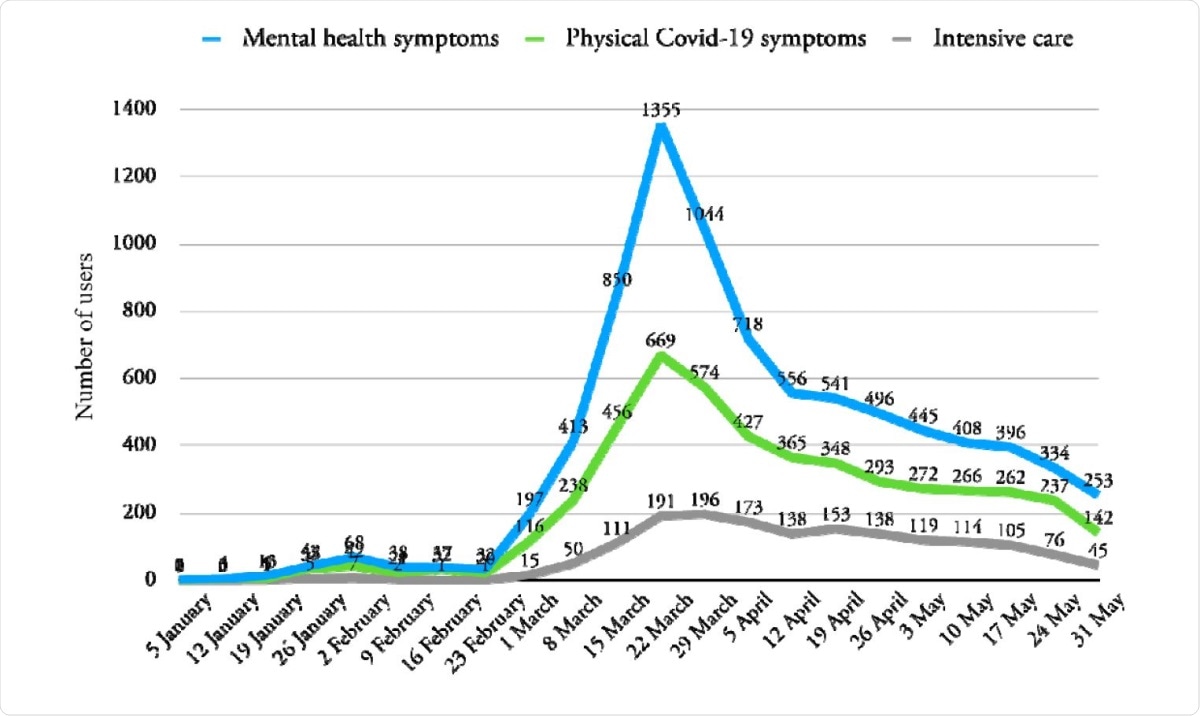Nearly one year into the coronavirus disease 2019 (COVID-19) pandemic, many countries have experienced a second wave of infections. The increasing number of cases may worsen as these countries enter the winter season.
During the first wave of the COVID-19 cases, caused by the severe acute respiratory syndrome coronavirus 2 (SARS-CoV-2), lockdown measures have been imposed in most countries affected. During this time, many individuals have coped with isolation and lack of social interaction. The number of mental health issues surged alongside COVID-19 cases.
A team of researchers at King's College London, UK, and other institutions used publicly accessible sources of real-world data, such as online health forums. They found that authors of COVID-19 related posts most frequently mentioned mental health symptom keywords during the first wave, followed by physical symptoms and intensive care keywords.
The findings suggest that the pandemic had a significant impact on the mental health of some affected individuals. The marked increase in mental health symptoms-related posts in early March, when the World Health Organization (WHO) declared the COVID-19 pandemic, is tied to the rise in people's anxiety and depression in response to the outbreak.

 This news article was a review of a preliminary scientific report that had not undergone peer-review at the time of publication. Since its initial publication, the scientific report has now been peer reviewed and accepted for publication in a Scientific Journal. Links to the preliminary and peer-reviewed reports are available in the Sources section at the bottom of this article. View Sources
This news article was a review of a preliminary scientific report that had not undergone peer-review at the time of publication. Since its initial publication, the scientific report has now been peer reviewed and accepted for publication in a Scientific Journal. Links to the preliminary and peer-reviewed reports are available in the Sources section at the bottom of this article. View Sources
Increased mental health impacts
The coronavirus pandemic first emerged in China in December 2019. Since then, it has spread to 191 countries and regions, infecting over 74.88 million people. Measures to combat the COVID-19 pandemic have resulted in unprecedented societal restrictions worldwide.
Many countries were locked down, preventing non-essential travel. Schools and some businesses were closed. As a result, people were isolated, while many lost their jobs or business.
The mental health impacts of these measures and accompanying socioeconomic stressors are likely to be extensive. For instance, social distancing restrictions made it harder to maintain regular contact between family and friends, including health professionals.
The pandemic's psychological and emotional burden may increase the risk of relapse or worsen existing mental health disorders. Past studies have tied mental health disorders to an increased susceptibility to infections.
The study
In the study, published on the preprint medRxiv* server, the researchers obtained data from online health forums using a novel technique known as natural language processing (NLP).
Online health forums are discussion websites on the internet, where people converse in posted messages.
Between January and May 2020, the team found a marked increase in the posts related to COVID-19. The posts' frequency surged dramatically in early March 2020, when the WHO declared the outbreak as a pandemic.
The researchers found posters of COVID-19 related posts most frequently mentioned mental health symptom keywords during this period. After stating these symptoms, they also posted physical symptoms and intensive care keywords.

Number of users making posts in threads related to COVID-19 which included physical symptoms, mental health symptoms or intensive care keywords.
Overall, the researchers extracted data from a large sample of more than 53,000 unique users.
During the study period, about 4% of first-time posters and over 20% in the peak period, made their first contribution to the forum in a COVID-19-related post. Moreover, 77% of COVID-19 threads were initiated by users who had never posted about the topic before and decided to start by creating their thread.
Our finding suggests that the pandemic is driving users to engage more actively in community forum services in times of uncertainty,” the researchers noted.
The posts tackling COVID-19 and related comorbidities increase early to mid-March around the time when lockdowns were imposed. The pandemic and the public health response significantly impacted the posters’ questions about mental health.
The team concluded that real-time data sources such as online health forums are essential for tracking fluctuating population health.
We found that the majority of posts in online forum data related to COVID-19 concerning features related to mental health and that the peak in frequency of posts corresponded with the early phase of the pandemic, indicating the significant impact of COVID-19 on the mental health of susceptible populations,” the researchers concluded in the study.

 This news article was a review of a preliminary scientific report that had not undergone peer-review at the time of publication. Since its initial publication, the scientific report has now been peer reviewed and accepted for publication in a Scientific Journal. Links to the preliminary and peer-reviewed reports are available in the Sources section at the bottom of this article. View Sources
This news article was a review of a preliminary scientific report that had not undergone peer-review at the time of publication. Since its initial publication, the scientific report has now been peer reviewed and accepted for publication in a Scientific Journal. Links to the preliminary and peer-reviewed reports are available in the Sources section at the bottom of this article. View Sources
Source:
Journal references:
- Preliminary scientific report.
Patel, R., Smeraldi, F., Abdollahyan, M., Irving, J., and Bessant, C. (2020). Investigating mental and physical disorders associated with COVID-19 in online health forums. medRxiv. doi: https://doi.org/10.1101/2020.12.14.20248155, https://www.medrxiv.org/content/10.1101/2020.12.14.20248155v1
- Peer reviewed and published scientific report.
Patel, Rashmi, Fabrizio Smeraldi, Maryam Abdollahyan, Jessica Irving, and Conrad Bessant. 2021. “Analysis of Mental and Physical Disorders Associated with COVID-19 in Online Health Forums: A Natural Language Processing Study.” BMJ Open 11 (11): e056601. https://doi.org/10.1136/bmjopen-2021-056601. https://bmjopen.bmj.com/content/11/11/e056601.